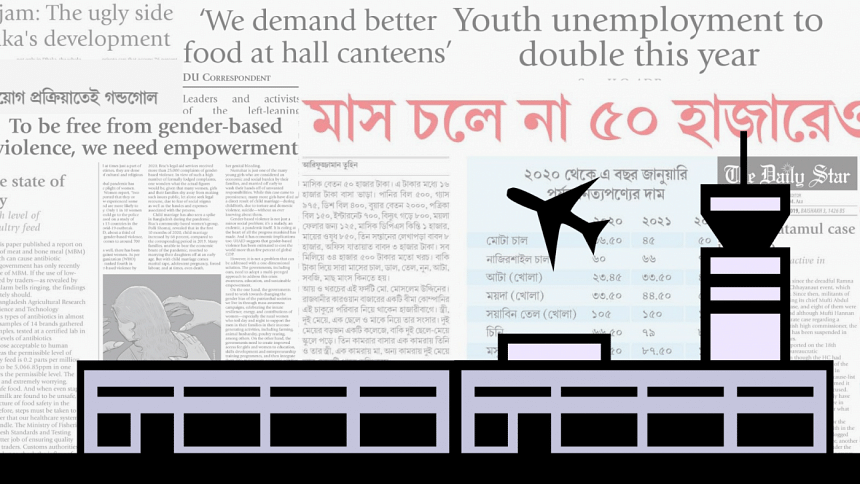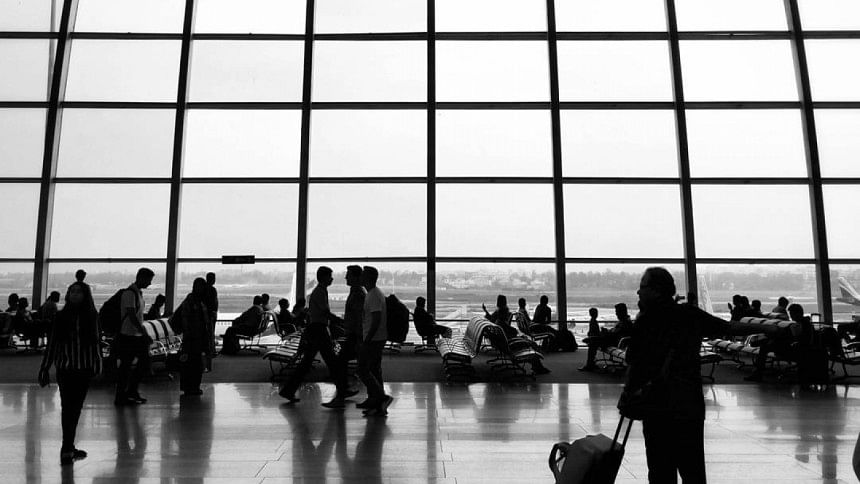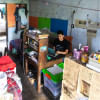ALL THE REASONS WE LEAVE

"Of course, higher education played a major role in my decision to move here and I don't plan on going back anytime soon. I acknowledge that every nation has its issues, including the first-world country I currently live in. But in comparison, I see a better scope for myself to build a life here than in Bangladesh," states Tasneem Tahrin, a 25-year-old graduate student of University of Toronto, in Canada.
The desire to leave the country is becoming more and more common among young Bangladeshis. Despite living in a rapidly growing economy, which by definition should entail better living standards, why is the youth so eager to leave their homeland behind?
It seems as though a large proportion of Bangladeshi citizens are dissatisfied with their lives here, particularly young people.
To further explore this phenomenon, we surveyed 240 youths within the age range of 17 to 28. We asked questions regarding how they feel about living in Bangladesh, if they have plans to move abroad, what serves as reasons behind the said plans, and how their families feel about it.

Over 75 percent of the participants said that they would rather live abroad, the most common reasons being seeking a better standard of living, freedom, and the unsafe environment here.
The quality of education in Bangladesh has always been a pressing issue for people, many choosing to go abroad to ensure a better quality of education for themselves, and consequently, for their families. Dissatisfaction with the quality of education was evident when asked to explain why the respondents or their families plan a future away from here.
Moreover, 82 percent of the respondents who expressed the desire to move abroad plan to do so by opting for foreign higher education.
Another issue that came up alongside education and safety, is lifestyle. Many respondents expressed their and their parents' concerns about the living standards in Bangladesh. Due to over-population and unplanned rapid urbanisation, the population is deprived of fresh air, recreational space, and greenery. The lifestyle in the cities here is increasingly becoming highly pedestrian and uninspiring day by day.
"I feel like the environment around us is very constricting and suffocating and it is natural for a creative individual to feel like their creative pursuits, thoughts, and processes are being inhibited here," says Farhan Ajmaine, a 23-year-old junior at Brac University.
In 2021, Dhaka was ranked as the seventh most dangerous city according to the Safe Cities Index, a report by the Economist Intelligence Unit. Seventy-one percent of our 134 female respondents have stated safety concerns to be a major contributing factor to them wanting to leave. However, certain societal expectations and prejudices make migrating abroad more challenging for women than men.
Maliha Tabassum, a 22-year-old senior at Brac University describes a predicament of the same sort when asked of social and familial barriers she might be facing. "I do want to go abroad for higher studies. Also, the safety of women in recent years and the years to come is very questionable in our country. One of the constraints that hold me back is my marital status. My family believes that it is better to have a partner than to go alone," she comments.

The generational gap between the youth and the elderly has become more discernible in recent times. Many feel that the social institutions and family backwardness, alongside other incompatibilities, hold them back here. They believe that they will be able to exercise their rights and choices freely in a different country than here. The incompatibility is exacerbated by the religious radicalisation that is observed in present times. The lack of political stability also serves as one of the driving factors for people's reluctance to plan out their lives here.
Much of the youth have overcome certain taboos and stigmas and have learned to speak for themselves, against dated notions and ideas. The discrepancy in mindsets and opinions between the older generation and the youth is noticeable now, especially due to social media and the voice it has given everyone.
"I wanted to move abroad for quality education. However, it turned out that there's more to it. I want to have the choice to live how I want and explore career options. It's suffocating for me that I barely have such liberties in Bangladesh. Secondly, I am the kind of person who loves multiculturalism and would prefer to go to a country that has such practice," explains Lenah Mehzabin Prieta, 22, a senior at East West University.
She adds, "I had to work really hard to convince my parents that marriage should not be a prerequisite for me. I had to cancel my plans for undergraduate studies because of their disapproval. They still prefer marriage for me, but no longer force it. So yes, being a woman made it more difficult for me."
However, for some people, leaving behind their families and the place they grew up in is too big of a sacrifice to make despite the difficulties Bangladesh may present. This is apparent from our survey, in which 56 percent of the respondents who said they do not want to leave, stated being close to family as the main reason for it.
"Prioritising family is the primary reason I want to stay here, and I want to take full responsibility for them. Moreover, I have a strong emotional attachment to this place and would like to give back to the society that nurtured me," says Mumnoon Zawer, 25, a trainee engineer at Digital Powerhouse.
"There are a lot of issues here, but for me, it's all about adjusting. We all suffer more or less because of it, but I'm still hopeful. I believe we are progressing towards betterment and the hardships that come with living here will slowly be resolved," he adds.
Bangladesh is infamous for its "brain drain" index, which stood at 7.6 in 2019, much higher than the average of 5.5 according to data from Fund for Peace. Dhaka alone has a population of over 20 million and has been ranked as the fourth least liveable city in the world by the Global Liveability Index 2021.

Upwards of 400,000 people move to Dhaka every year, many of whom migrate for higher education or in hopes of earning a livelihood given the lack of opportunities in their hometowns. However, due to mass migration, the job market in Dhaka has also become saturated. Young undergraduates are suffering the consequences of overpopulation in the form of lack of job opportunities. An undergraduate degree no longer guarantees a rewarding job. As a matter of fact, many employers now look for experience and a master's degree for entry level jobs, causing further discouragement among fresh graduates.
"It's difficult to land a good job here without networks, especially for undergraduates. Employers have high expectations from potential candidates in terms of qualifications, but they don't offer high enough salaries in exchange for those qualifications. Many organisations have even increased working hours and expect employees to work six days a week. Such unfair changes go unchecked and the burden falls on fresh graduates," says Salma Fariha, 24, a recent graduate of North South University.
Bangladeshi youth, those who want to, leave the country for a combination of reasons such as better living standards, security reasons, cultural disagreements, quality education or job opportunities. It is evident that the country's sole focus on economic growth has come with grave repercussions, compelling its young residents to want to leave.
These responses beg the question, can Bangladesh truly prosper without tending to the plethora of problems the youth are facing?
References
1. Macrotrends.net. Dhaka, Bangladesh Metro Area Population 1950-2022. Global Liveability Index 2021: Dhaka named 4th worst city to live in
2. The Guardian (December 1, 2015). Dhaka: the city where climate refugees are already a reality.
Aysha's blocks exist longer than summers in Bangladesh. Give her solutions at [email protected]
Nuzhat zones out every ten minutes. Tell her to snap out of it at [email protected]

 For all latest news, follow The Daily Star's Google News channel.
For all latest news, follow The Daily Star's Google News channel. 








Comments